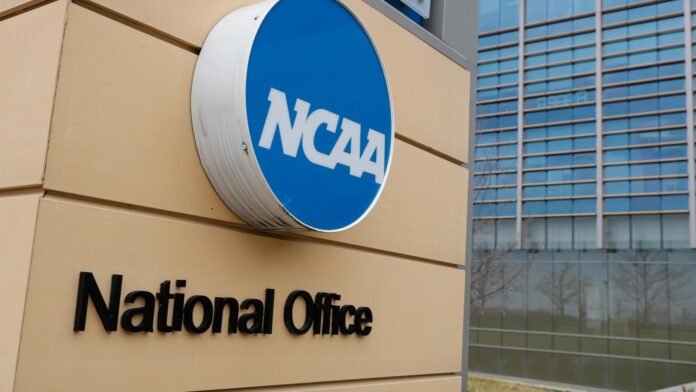PHILADELPHIA — Student athletes who primarily benefit their schools can be eligible for a salary under federal wage and hour law, a U.S. appeals court ruled Thursday in a setback for the NCAA.
The court, in the latest challenge against the NCAA’s long-held idea of ”amateurism” in college sports, said a test should be developed to distinguish between students who play college sports for fun and those whose efforts “cross the legal line and result in employment.”
“With professional athletes as the clearest indicators, sports can certainly be compensable work,” wrote U.S. Circuit Judge L. Felipe Restrepo. “Ultimately, the touchstone remains whether the cumulative circumstances of the relationship between the athlete and the university or NCAA reveal an economic reality that is that of an employee-employer.”
A colleague in a dissent questioned the difficulty of such a process, noting that nearly 200,000 students compete on nearly 6,700 Division I teams. The NCAA had hoped the case has been dismissedbut instead the case goes back to court for fact-finding.
The ruling follows a 2021 Supreme Court decision that prompted the NCAA to change its rules to allow athletes to profit from their name, image and likeness. In May, the NCAA announced a nearly $2.8 billion revenue-sharing plan that could send millions of dollars directly to athletes next year.
The Division I athletes and former athletes behind the Philadelphia lawsuit are seeking a more modest hourly wage, comparable to that of their colleagues in work-study programs. They allege that colleges are violating fair labor practices by not paying them for the time they spend on their sports, which they say can average 30 or more hours a week.
Attorney Paul McDonald, who represents the plaintiffs, has suggested that athletes can earn $2,000 a month or $10,000 a year by participating in NCAA sports. He said many students need the money for everyday expenses.
“The idea that student athletes can’t be both students and employees is just not true when you have student employees on campus,” McDonald said Thursday. “It’s just unfathomable that athletes wouldn’t be held to the same criteria as employees.”
A district judge had declined to dismiss the case, prompting the NCAA in Indianapolis to ask the appeals court to throw the case out. The three-member panel heard arguments in February.
Defendants include the NCAA and its member schools, including Duke University, Villanova University and the University of Oregon. An NCAA spokesman did not immediately respond to messages seeking comment Thursday.
The unanimous decision of the Supreme Court that caused the NIL payments, lifted the ban on tuition reimbursements beyond full scholarships. Schools that recruit top athletes can now offer tens of thousands of dollars in education-related benefits, such as study abroad programs, computers and graduate scholarships.
“Tradition alone cannot justify the NCAA’s decision to undertake a massive fundraising enterprise on the backs of student-athletes who are not fairly compensated,” Justice Brett Kavanaugh wrote in a dissent. “The NCAA is not above the law.”
But that case did not answer the question of whether college athletes are employees entitled to direct payment — the key issue before the U.S. 3rd Circuit Court panel.
Baylor University President Linda Livingston said at the NCAA conference in January that this model would allow coaches to become their players’ bosses.
“Converting student-athletes into employees will have a far-reaching, staggering and potentially catastrophic impact on college sports as a whole,” said Livingston, chairman of the NCAA Board of Governors. “We need Congress to affirm the unique relationship that student-athletes have with their universities.”
But the relationship is coming under increasing scrutiny.
In 2021, a top lawyer for the National Labor Relations Board said in a memo that Student athletes should be treated as school employees.
And players have taken to social media to advocate for a cut of the hundreds of millions of dollars NCAA schools make from sports, including a campaign on the eve of the 2021 NCAA basketball tournament using the hashtag #NotNCAAProperty.
The NCAA compared the athletes at its conference to students who perform unpaid in theater groups, orchestras and other campus activities.
McDonald said these types of campus groups are led by students, while athletes’ time is managed by their coaches, in a manner similar to a job.
“The most scrutinized kids on any campus are the student-athletes,” he said earlier this year.



